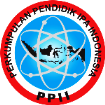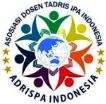Desain Pembelajaran Inkuiri dengan Skema Online Terintegrasi Aktivitas Argumentasi: Analisis Capaian Pengetahuan Konseptual dan Respon Mahasiswa Calon Guru IPA
Abstract
This research was conducted because the importance of the online learning process in order to keep it done with an emphasis on student activities to construct knowledge independently. This study aims to analyze conceptual knowledge and student responses to science teacher candidates when implementing an online inquiry learning process by integrating scientific argumentation activities. This research was used quantitative approach with pre-experiment design. The research activity was carried out by first determining the learning design, then applying the learning design to the students, totaling 38 students. In this study, a pretest and posttest were conducted to obtain data on the achievement of student conceptual knowledge. In addition, students also fill out a questionnaire to get student data responses to the learning process being carried out. The results showed that the learning activities carried out were able to increase the conceptual knowledge of students in the high category. In addition, the learning process generally received a positive response from students. The learning process is carried out in three sessions. The first session consisted of problem identification, conducting literature studies, and formulating hypotheses with provisional arguments. The second session consisted of investigation, data analysis, evaluation, evaluation and argumentation. The third session consisted of activities to communicate the experimental results.
Keyword: inquiry learning, argumentation activity, online schema on inquiry, conceptual knowledge, students responses.
ABSTRAK
Penelitian ini dilakukan karena melihat pentingnya proses pembelajaran online agar tetap dilakukan dengan menitikberatkan pada aktivitas mahasiswa untuk mengkonstruksi pengetahuan secara mandiri dan bermakna. Penelitian ini bertujuan untuk menganalisis capaian pengetahuan konseptual dan respon mahasiswa calon guru IPA ketika diterapkan proses pembelajaran inkuiri yang di desain secara online dengan mengintegrasikan aktivitas argumentasi ilmiah. Penelitian ini dilakukan menggunakan pendekatan kuantitatif dengan desain penelitian pre-eksperimen. Kegiatan penelitian dilakukan dengan merancang terlebih dahulu desain pembelajaran, kemudian menerapkan desain pembelajaran kepada mahasiswa, sebanyak 38 mahasiswa. Pada penelitian ini dilakukan pretest dan posttes untuk mendapatkan data capaian pengetahuan konseptual mahasiswa. Selain itu juga mahasiswa mengisi kuesioner untuk mendapatkan data respon mahasiswa terhadap proses pembelajaran yang dilakukan. Hasil penelitian menunjukkan bahwa kegiatan pembelajaran yang dilakukan mampu meningkatkan pengetahuan konseptual mahasiswa dengan kategori tinggi. Selain itu, proses pembelajaran yang dilakukan secara umum mendapat respon yang positif dari mahasiswa. Proses pembelajaran dilakukan dalam tiga sesi. Sesi pertama terdiri dari aktivitas mengidentifikasi masalah, melakukan studi literatur, dan merumuskan hipotesis dengan disertai argumentasi sementara. Sesi kedua terdiri dari aktivitas penyelidikan, analisis data, dan melakukan evaluasi hipotesis serta argumentasi sementara. Sesi ketiga terdiri dari aktivitas mengkomunikasikan hasil eksperimen.
Kata kunci: pembelajaran inkuiri, aktivitas argumentasi, inkuiri dalam skema online, pengetahuan konseptual, respon mahasiswa.
Full Text:
PDFReferences
Arinto, P. B. (2016). Issues and Challenges in Open and Distance E-Learning: Perspectives from the Philippines. The International Review of Research in Open and Distributed Learning, 17(2).
Biao, I. (2012). Open and Distance Learning: Achievements and Challenges in a Developing Sub-Educational Sector in Africa. In Distance Education. Intech.
Erduran, S., & Maria, P. (2008). Argumentation in Science Education. London: Spinger Science.
Febriastuti, Y. D. (2017). Inovasi Model Pembelajaran Guided Inquiry untuk Meningkatkan Kemampuan Kognitif Siswa SMP. Indonesian Journal of Science and Education, 1(1), 49-56.
Garrison, R. (2000). Theoretical Challenges for Distance Education in the 21st century: A shift from Structural to Transactional Issues. The International Review of Research in Open and Distributed Learning, 1(1).
Gumilar, S., & Subali, B. (2018, March). Scientific Method by Argumentation Design: Learning Process for Maintaining Student’s Retention. in Journal of Physics Conference Series (Vol. 983, No. 1, p. 012021).
Harlen, W. (2014). Helping children’s development of inkuiri skills. Inkuiri in primary science education (IPSE), 1: 5-19.
Heong, Y. M., Yunos, J. M., Othman, W., Hassan, R., Kiong, T. T., & Mohamad, M. M. (2012). The Needs Analysis of Learning Higher Order Thinking Skills for Generating Ideas. Procedia-Social and Behavioral Sciences, 59, 197-203.
Kai Wu, H. (2006). Developing Sixth Graders’ Inkuiri Skills to Construct Explanations in Inkuiri‐ based Learning Environments. International Journal of Science Education, 28 (11): 1289–1313.
Karim, F. A., Kayar, R., Cheng, T. J., & Sopah, F. M. (2018). Readiness In Applying Higher Order Thinking Skills After Attending Courses. Human Sustainability Procedia.
Miller, S. (2012, August). Developing Higher Order Thinking Skills. in Proceedings of The Australian Conference on Science and Mathematics Education (formerly UniServe Science Conference).
Musingafi, M. C., Mapuranga, B., Chiwanza, K., & Zebron, S. (2015). Challenges for Open and Distance Learning (ODL) Students: Experiences from Students of the Zimbabwe Open University. Journal of Education and Practice, 6(18), 59-66.
Muslim, Suhandi, A. (2012). Pengembangan Perangkat Pembelajaran Fisika Sekolah untuk Meningkatkan Kemampuan kognitif dan Keterampilan Berargumentasi. Jurnal Pendidikan Fisika Indonesia, 8:174-183.
Saido, G. M., Siraj, S., Nordin, A. B. B., & Al_Amedy, O. S. (2018). Higher order thinking skills among secondary school students in science learning. MOJES: Malaysian Online Journal of Educational Sciences, 3(3), 13-20.
Sampson, V., & Gerbino, F. (2010). Two Instructional Models That Teacher Can Use to Promote & Support Scientific Argumentation In the Biology Classroom. The American Biology Teacher, 72 (7): 427-431.
Siswanto. (2014). Penerapan Model Pembelajaran Pembangkit Argumen Menggunakan Metode Saintifik untuk Meningkatkan Kemampuan Kognitif dan Keterampilan Berargumentasi Siswa. Jurnal Pendidikan Fisika Indonesia, 10 (2): 104-116.
Toulmin, S. (2003). The Uses of Argument. New York: Cambridge University Press.
Wenning, C., J. (2011). Experimental inkuiri in introductory physics courses. Journal of Physics Teacher Education, 6 (2): 2-8.
Yusiran, Y., & Siswanto, S. (2016). Implementasi Metode Saintifik Menggunakan Setting Argumentasi pada Mata Kuliah Mekanika untuk Meningkatkan Kemampuan Kognitif Mahasiswa Calon Guru Fisika. Jurnal Penelitian & Pengembangan Pendidikan Fisika, 2(1), 15-22.
Zohar, Anat, and Yehudit J. Dori. "Higher order thinking skills and low-achieving students: Are they mutually exclusive?." The journal of the learning sciences 12.2 (2003): 145-181.
DOI: http://dx.doi.org/10.24014/jnsi.v4i1.11475
Refbacks
- There are currently no refbacks.

Journal of Natural Science and Integration
E-ISSN: 2620-5092 P-ISSN: 2620-4967
Published By:
Department of Science Education, Faculty of Education and Teacher Training,
State Islamic University of Sultan Syarif Kasim Riau, Indonesia
Mailing Address:
Jl. H.R Soebrantas Km. 15 No. 155
Kelurahan Simpang Baru
Kecamatan Tuah Madani, Pekanbaru, Riau, Indonesia
Email: jnsi.tadrisipa@uin-suska.ac.id
Indexed By:
Journal of Natural Science and Integration is licensed under a Creative Commons Attribution 4.0 International License.


_-_Copyy2.png)






.jpg)
.png)
.jpg)
.jpg)




